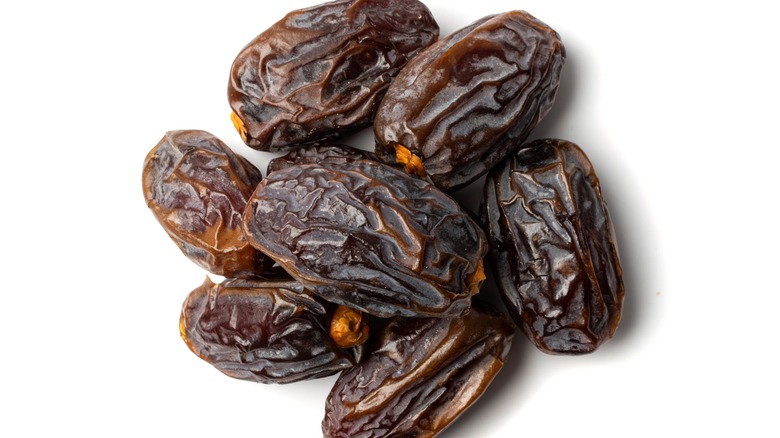The Flavor Difference Between Fresh And Dried Dates
Sweet dates are easy to snack on, can be folded into recipes like Michael Symon's pancetta, and aesthetically placed onto charcuterie boards. But with over a dozen different varieties of dates, can you use fresh and dried dates similarly in your culinary projects? Not so fast.
Dates can be sold categorized in different stages of freshness. Dates that are not quite ripe are called khalal. These crunchy dates are delicate and sweet. Juicy khalal dates can be tricky to find, but they are the freshest kinds of dates you can feast upon. These plump pieces of fruit are pale in color, and the texture of the flesh is pear-like, crunchy, and firm to bite into. Khalal dates are also called yellow crunchy dates, and are delicately seasonal, found briefly during August and September. Perhaps because these dates are delicious eaten fresh, and can only be purchased for a few weeks each year, they are less likely to be incorporated into recipes.
Dates for every season
Ripe dates are juicy, moist, and taste like honey. When dates have reached this stage, the texture and color of the fruit change, as the dates begin to lose moisture and shrink in size. Ripe dates, also called rutab, are light brown in appearance and caramel-sweet to taste. While ripe dates can be enjoyed as is, these delicious morsels can be added to recipes such as stews, salads, and desserts. Candy-like rutab dates have an abbreviated shelf life, but they can be frozen and kept up to two years.
Chewy, dried dates are richer on the palate, delivering caramel and toffee notes to recipes. Dried dates are called tamar when they are in their last stage — a dry, dark treat with a glossy coat. Because dried dates don't have much moisture, their shelf life can last up to two years. Naturally high in sugar, dried dates contain antioxidants, vitamins and minerals, and fiber. Not only can dried dates make quick, sweet snacks and post-meal treats, they can be used in a variety of cooking and baking styles and re-hydrated when required.

